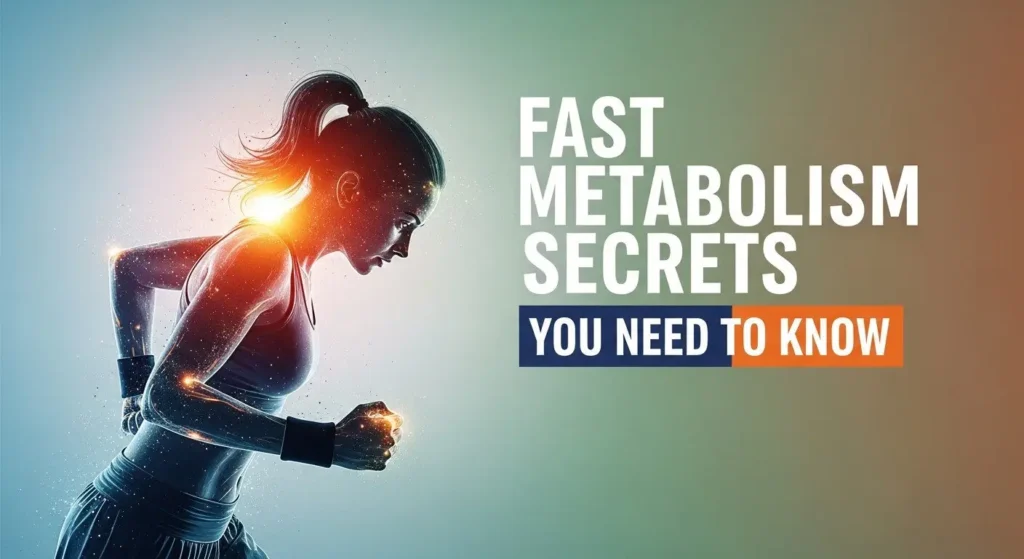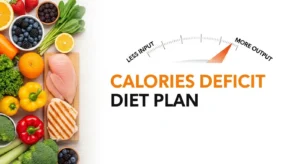Have you ever wondered why some people seem to eat whatever they want and never gain weight, while others struggle to shed even a few pounds? The answer often lies in something called your fast metabolism. Think of your fast metabolism as the inner engine of your body. It's the process where your body turns the food and drinks you consume into energy. This energy is then used for everything you do, from breathing and thinking to running and lifting weights.

A “fast metabolism” means your body is very efficient at burning calories for energy. This can make it easier to maintain a healthy weight or even lose weight. But here's the exciting part: while genetics play a role, you're not stuck with the metabolism you were born with! There are many powerful, science-backed secrets you can use to fire up your body's engine and enjoy the benefits of a fast metabolism. Get ready to discover how to boost your energy, improve your health, and reach your weight goals!
Boost Your Metabolism: Daily Habits Checklist 🌱
Check off the habits you practice regularly to see how many metabolism boosters you're using!
You've checked 0 out of 9 metabolism-boosting habits!
Key Takeaways
- Your metabolism is your body's energy engine. It converts food into fuel for all your daily activities, from sleeping to exercising.
- Building muscle is key. Muscle tissue burns more calories at rest than fat tissue, making strength training a powerful metabolism booster.
- Protein, fiber, and water are your allies. Eating enough protein and fiber, along with staying well-hydrated, helps your body burn more calories and feel fuller.
- Don't skip sleep or stress less. Poor sleep and high stress levels can mess with your hormones, slowing down your metabolism. Prioritize rest and relaxation.
- Move more throughout the day. Beyond planned workouts, simple activities like walking or taking the stairs add up, increasing your daily calorie burn. 🚶♂️
Understanding Your Metabolism: The Body's Inner Engine
Before we dive into the secrets, let's get a clearer picture of what metabolism actually is.
Imagine your body as a car. Food is the fuel, and your metabolism is the engine that burns that fuel to make the car go. This “burning” process is called metabolic rate. It's how quickly your body uses energy (calories) to keep you alive and moving.
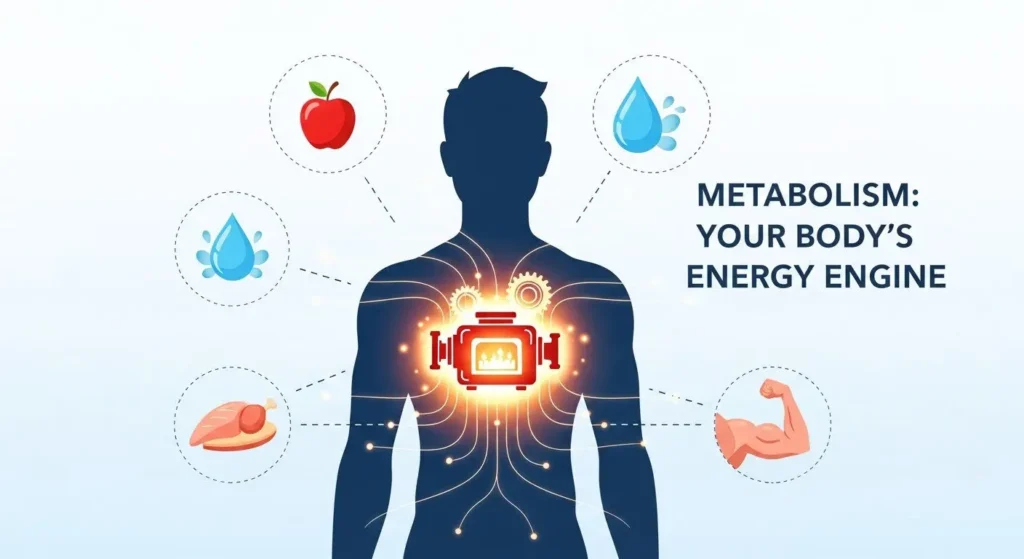
Your body constantly uses energy, even when you're just sitting still or sleeping. This basic energy use is called your Basal Metabolic Rate (BMR). It accounts for about 60-75% of the calories you burn each day! Your BMR powers essential functions like:
- Breathing
- Circulating blood
- Maintaining body temperature
- Cell growth and repair
- Brain function
Beyond your BMR, you also burn calories through:
- Physical Activity: This includes planned exercise (like running or lifting weights) and everyday movements (like walking, cleaning, or even fidgeting). This is often called Non-Exercise Activity Thermogenesis (NEAT).
- Thermic Effect of Food (TEF): Your body uses energy to digest, absorb, and store the nutrients from the food you eat. Protein has the highest TEF, meaning it takes more energy to process.
All these factors together make up your Total Daily Energy Expenditure (TDEE) – the total calories you burn in a day.
What Influences Your Metabolic Rate?
Many things can affect how fast or slow your metabolism runs. Some you can control, others you can't.
- Age: As you get older, your metabolism naturally tends to slow down. This is partly due to losing muscle mass and becoming less active.
- Gender: Men generally have a faster metabolism than women because they tend to have more muscle mass and less body fat.
- Genetics: Your genes play a role in determining your natural metabolic rate. Some people are just born with a slightly faster or slower engine.
- Body Size and Composition: Larger people generally have a higher BMR because they have more cells that need energy. More importantly, people with more muscle mass burn more calories at rest than those with more fat. This is a HUGE secret we'll talk about!
- Thyroid Hormones: Your thyroid gland produces hormones that control your metabolism. If your thyroid isn't working properly, it can significantly affect your metabolic rate.
- Activity Level: The more active you are, the more calories you burn, and the higher your overall metabolic rate.
Nutrition: Fueling Your Metabolic Fire
What you eat (and how you eat it) has a massive impact on your metabolism. Think of food as the fuel for your internal engine. The right fuel can make it run hotter and more efficiently!
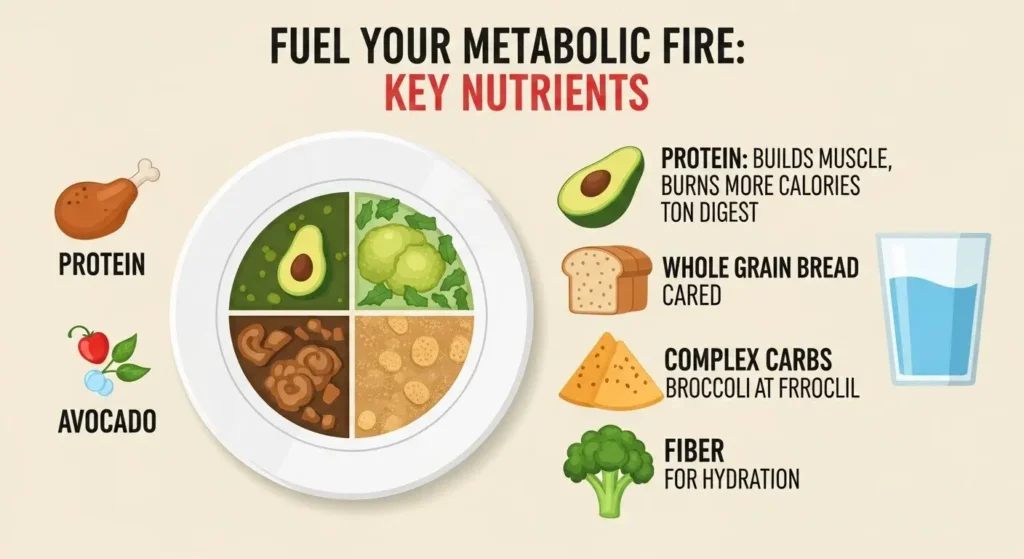
1. Protein Power: The Metabolism Muscle Builder
If there's one nutrient you shouldn't skimp on for a fast metabolism, it's protein. Here's why:
- High Thermic Effect: As mentioned, protein has the highest TEF. Your body uses about 20-30% of the calories from protein just to digest it. For carbs, it's 5-10%, and for fats, it's 0-3%. This means eating protein literally burns more calories!
- Muscle Builder: Protein is essential for building and repairing muscle tissue. More muscle means a higher resting metabolism, even when you're not working out.
- Satiety: Protein keeps you feeling full and satisfied longer, which can help reduce overall calorie intake and prevent mindless snacking.
How to get enough protein: Include a good source of protein at every meal.
| Meal | Protein Sources (Examples) |
|---|---|
| Breakfast | Eggs 🍳, Greek yogurt, protein smoothie, cottage cheese |
| Lunch | Chicken breast, fish, lean beef, lentils, beans, tofu |
| Dinner | Turkey, salmon, shrimp, chickpeas, quinoa |
| Snacks | Nuts, seeds, edamame, protein bar, hard-boiled egg |
“Don't underestimate the power of protein! It's not just for bodybuilders; it's a metabolic super-nutrient for everyone.”
2. Complex Carbs: The Smart Energy Choice
Carbohydrates often get a bad rap, but the right kind of carbs are crucial for energy and a healthy fast metabolism. Focus on complex carbohydrates and those rich in fiber.
- Steady Energy: Complex carbs (like whole grains, vegetables, and fruits) provide a slow and steady release of energy, preventing energy crashes that can lead to cravings.
- Fiber Boost: Many complex carbs are high in fiber, which also has a thermic effect and helps keep your digestive system healthy.
Good carb choices:
- Whole grains: oats, brown rice, quinoa, whole-wheat bread
- Vegetables: broccoli, spinach, sweet potatoes, bell peppers
- Fruits: berries, apples, bananas
3. Healthy Fats: Essential for Hormones
Don't be afraid of fats! Healthy fats are vital for hormone production, which plays a big role in fast metabolism. They also help you feel full.
- Hormone Balance: Fats are necessary for producing hormones that regulate metabolism, like thyroid hormones.
- Nutrient Absorption: They help your body absorb fat-soluble vitamins (A, D, E, K).
Include healthy fats from:
- Avocados
- Nuts and seeds (almonds, walnuts, chia seeds)
- Olive oil, avocado oil
- Fatty fish (salmon, mackerel)
4. Fiber: The Unsung Hero
Fiber is a type of carbohydrate that your body can't digest. But don't let that fool you – it's incredibly important!
- Digestion Power: Fiber adds bulk to your diet, aiding digestion and promoting regular bowel movements.
- Satiety: Like protein, fiber helps you feel full, reducing the likelihood of overeating.
- Gut Health: It feeds the beneficial bacteria in your gut, which are linked to better fast metabolism and overall health.
You can find fiber in fruits, vegetables, whole grains, and legumes. Aim for 25-30 grams per day.
5. Hydration: Water is Vital
It might sound too simple, but drinking enough water is a powerful metabolism booster.
- Calorie Burning: Studies show that drinking water can temporarily increase your metabolic rate. Cold water might even have a slight edge, as your body uses energy to warm it up.
- Fat Burning: Water is essential for the process of lipolysis, where your body breaks down fat for energy.
- Energy Levels: Dehydration can make you feel sluggish, reducing your activity levels and calorie burn.
Tip: Start your day with a large glass of water. Carry a water bottle with you and sip throughout the day. Aim for 8-10 glasses (about 2-3 liters) daily. Herbal teas also count!
6. Spice It Up! Certain Foods & Drinks
Some foods and drinks have compounds that can give your metabolism a little extra kick:
- Green Tea: Contains catechins and caffeine, which can increase fat burning and metabolic rate.
- Coffee: The caffeine in coffee can temporarily boost metabolism and enhance fat burning.
- Chili Peppers: Capsaicin, the compound that gives peppers their heat, can slightly increase calorie burning and reduce appetite.
- Apple Cider Vinegar: Some research suggests it might help improve metabolism and fat burning, though more studies are needed.
Exercise: The Ultimate Metabolism Accelerator
While diet is crucial, exercise is arguably the most powerful way to directly influence your metabolic rate, especially over the long term. It's not just about burning calories during your workout; it's about building a body that burns more calories all the time.
1. Strength Training: Build Your Metabolic Furnace
This is the big one! Strength training (also known as weightlifting or resistance training) is your secret weapon for a fast metabolism.
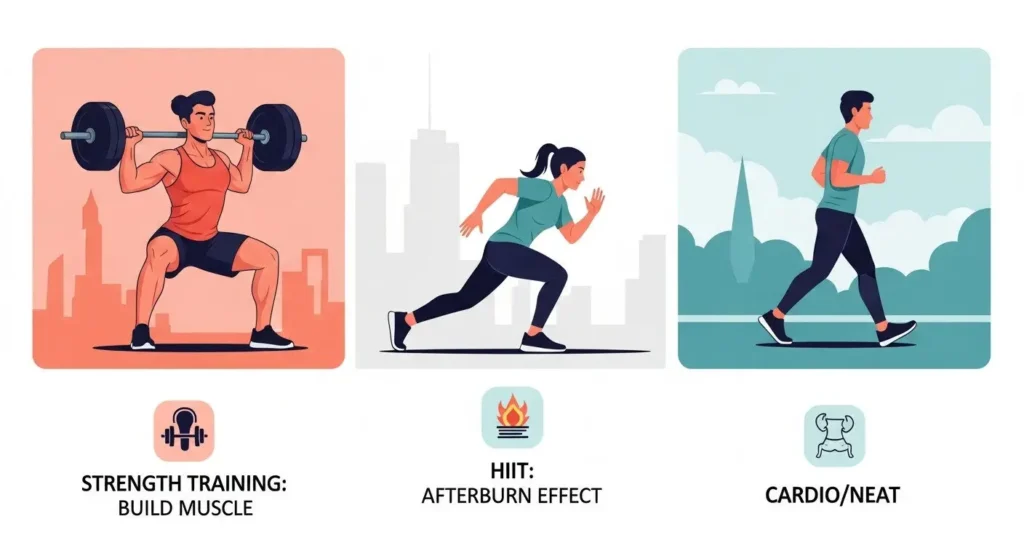
- Muscle Burns More: Muscle tissue is metabolically active, meaning it burns more calories at rest than fat tissue. For every pound of muscle you gain, your body burns an extra 6-10 calories per day, even when you're just sitting on the couch! Fat, on the other hand, burns only about 2 calories per pound.
- Afterburn Effect (EPOC): After an intense strength training session, your body continues to burn extra calories for hours (sometimes up to 48 hours!) as it recovers and repairs muscle tissue. This is called Excess Post-exercise Oxygen Consumption (EPOC).
- Stronger Bones & Joints: Besides fast metabolism, strength training also builds stronger bones and joints, improving overall health and mobility.
How to start:
- Aim for 2-3 full-body strength training sessions per week.
- You can use weights, resistance bands, or even your own body weight (push-ups, squats, lunges).
- Focus on compound movements that work multiple muscle groups at once (squats, deadlifts, bench presses, rows).
- If you're new, consider working with a trainer to learn proper form and prevent injuries.
2. High-Intensity Interval Training (HIIT): Short Bursts, Big Results
HIIT involves short bursts of intense exercise followed by brief recovery periods. Think sprinting for 30 seconds, walking for 90 seconds, then repeating.
- Maximized Calorie Burn: HIIT burns a lot of calories in a short amount of time.
- Significant EPOC: Like strength training, HIIT creates a strong “afterburn effect,” keeping your metabolism elevated for hours post-workout.
- Improved Fitness: It boosts your cardiovascular fitness quickly.
Examples of HIIT:
- Sprinting on a track or treadmill
- Cycling with alternating fast and slow intervals
- Bodyweight exercises (burpees, jump squats) with short rests
- Jump rope
Caution: HIIT is intense. Start slowly and listen to your body. 1-3 sessions per week are usually enough.
3. Cardio: Steady State for Health
While strength training and HIIT are metabolic powerhouses, don't forget steady-state cardio (like jogging, swimming, or brisk walking).
- Direct Calorie Burn: Cardio burns calories during the activity itself.
- Heart Health: It's excellent for your heart and lung health.
- Stress Reduction: Many people find cardio a great way to relieve stress and clear their minds.
Aim for at least 150 minutes of moderate-intensity cardio per week, or combine it with your strength training.
4. NEAT: Move More, Burn More
Remember Non-Exercise Activity Thermogenesis (NEAT)? This refers to all the calories you burn from daily movements that aren't planned exercise. And it adds up!
- Take the stairs instead of the elevator.
- Park further away.
- Walk or bike short distances.
- Stand up and stretch every hour.
- Fidget! (Yes, seriously, small movements burn calories).
- Do household chores with enthusiasm.
“Every little bit of movement counts! Don't underestimate the power of simply being less sedentary.”
Lifestyle Habits for a Fast Metabolism
Beyond what you eat and how you move, your daily habits play a huge role in how your metabolism performs. Let's look at some often-overlooked secrets.
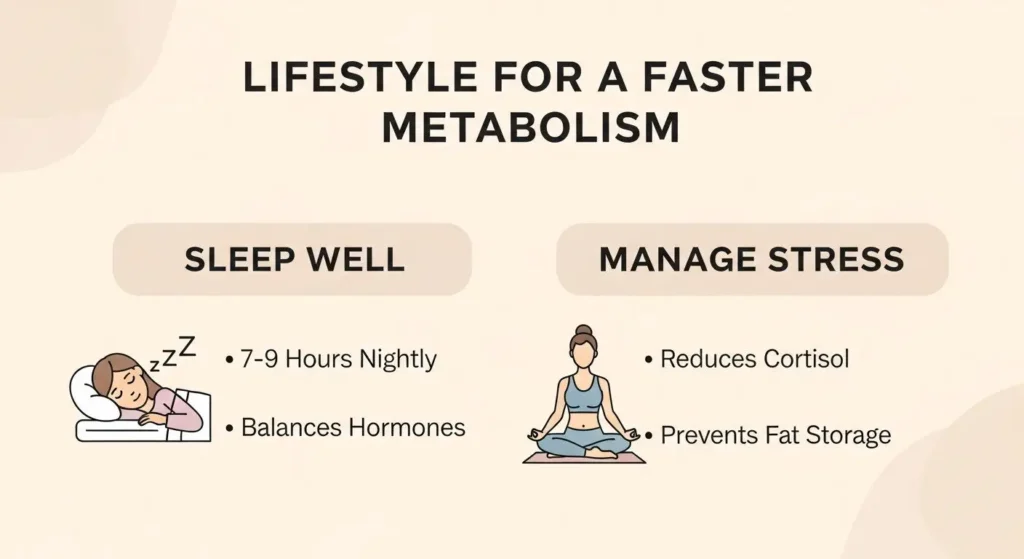
1. Sleep: The Forgotten Metabolism Booster
In our busy lives, sleep often takes a backseat. But sacrificing sleep can seriously mess with your metabolism.
- Hormone Regulation: Lack of sleep disrupts key hormones that control appetite and metabolism:
- Ghrelin (the hunger hormone): Increases when you're sleep-deprived, making you feel hungrier.
- Leptin (the satiety hormone): Decreases, so you don't feel full even after eating.
- Cortisol (the stress hormone): Increases, which can lead to fat storage, especially around the belly.
- Insulin Sensitivity: Poor sleep can reduce your body's sensitivity to insulin, making it harder for your cells to absorb glucose from your blood, which can contribute to weight gain.
- Energy for Activity: When you're tired, you're less likely to have the energy or motivation to exercise or even move around much, leading to fewer calories burned.
Aim for 7-9 hours of quality sleep per night. Create a relaxing bedtime routine, make your bedroom dark and cool, and try to go to bed and wake up at the same time each day, even on weekends.
2. Stress Management: Taming Cortisol
Chronic stress isn't just bad for your mind; it's bad for your metabolism too. When you're stressed, your body releases cortisol.
- Fat Storage: High levels of cortisol tell your body to store fat, particularly around your midsection.
- Muscle Breakdown: Cortisol can also break down muscle tissue, which, as we learned, is crucial for a fast metabolism.
- Cravings: Stress often leads to cravings for sugary and high-fat comfort foods, which can derail your healthy eating efforts.
Ways to manage stress:
- Meditation or deep breathing exercises
- Yoga or tai chi
- Spending time in nature
- Listening to calming music
- Hobbies that relax you
- Socializing with loved ones
- If you're feeling overwhelmed, consider talking to a therapist or counselor.
3. Consider Supplements (Wisely)
While whole foods and lifestyle changes are the foundation, some supplements might offer a small boost, but always approach them with caution and realistic expectations.
- Caffeine: Found in coffee and green tea extracts, it can temporarily increase metabolic rate.
- Green Tea Extract: Rich in antioxidants called catechins, which may help with fat burning.
- Protein Powder: A convenient way to ensure you're getting enough protein, especially after workouts.
- Creatine: Primarily helps with strength and muscle gain, which indirectly boosts metabolism.
Important Note: Supplements are not magic pills. They work best when combined with a healthy diet and regular exercise. Always talk to your doctor before starting any new supplement, especially if you have underlying health conditions or are taking medications. For example, if you're looking into general wellness or weight management support, it's good to understand what to expect from weight loss supplements like Liv Pure. Similarly, for men, maintaining prostate health is another key part of overall wellness, and looking into natural solutions, you might explore options like ProstaVive for prostate problems. It's always wise to have a guide to prostate supplements to make informed choices, and many seek natural solutions for prostate health as part of their holistic wellness journey.
Common Fast Metabolism Myths Debunked
There's a lot of misinformation out there about fast metabolism. Let's clear up some common myths!
Myth 1: Starvation Mode Permanently Destroys Your Metabolism
The Myth: If you eat too few calories, your metabolism will slow down so much that you'll never lose weight, and it will be permanently damaged.
The Reality: Yes, drastically cutting calories will cause your metabolism to slow down. This is your body's natural survival mechanism to conserve energy when food is scarce. It's called adaptive thermogenesis. However, it's not a permanent “destruction.” Once you return to a healthy, balanced eating pattern, fast metabolism will generally recover. The key is to avoid extreme, very low-calorie diets and focus on sustainable changes. Gradual calorie reduction, combined with strength training to maintain muscle, is a much better approach.
Myth 2: Eating Late at Night Makes You Fat
The Myth: Eating food after a certain time (e.g., 6 PM or 8 PM) will automatically lead to weight gain because your metabolism slows down at night.
The Reality: This is largely a myth. What truly matters for weight gain or loss is your total daily calorie intake and the quality of your food, not when you eat it. Your metabolism doesn't magically shut down at night; it's always working. However, many people tend to make poorer food choices late at night (high-calorie, processed snacks) and eat more mindlessly, which can lead to consuming excess calories. If you're hungry late at night, choose a small, nutrient-dense snack (like Greek yogurt or a piece of fruit) that fits within your daily calorie goals.
Myth 3: Some People “Can't” Lose Weight Because of a Slow Metabolism
The Myth: My metabolism is just too slow, so I'm destined to be higher weight.
The Reality: While individual metabolic rates vary, and some people do have naturally slower metabolisms (often due to genetics, age, or less muscle mass), it's rarely the sole reason someone “can't” lose weight. Significant metabolic differences between individuals are often smaller than people think. More often, perceived “slow metabolism” is due to a combination of factors:
- Lower muscle mass: Leading to a lower BMR.
- Less daily activity: Underestimating calorie intake and overestimating calorie burn.
- Unhealthy eating habits: Consuming more calories than needed.
- Poor sleep and high stress: As discussed earlier.
The good news is that by focusing on building muscle, staying active, eating nutrient-rich foods, and managing stress and sleep, you can significantly influence your metabolic rate, regardless of your starting point. It takes effort and consistency, but it is absolutely possible to boost your metabolism.
Putting It All Together: Your Action Plan
You've learned many secrets to a fast metabolism. Now, how do you put them into action? It's not about doing everything at once, but about building sustainable habits.
1. Start Small, Build Consistency
Don't try to overhaul your entire life overnight. Pick one or two things to focus on each week or month.
- Example 1: This week, focus on adding protein to every meal.
- Example 2: Next week, add 15 minutes of brisk walking to your day.
- Example 3: The week after, aim for 7 hours of sleep every night.
Consistency is far more important than perfection. Small, steady changes lead to big results over time.
2. Listen to Your Body
Pay attention to how different foods and exercises make you feel.
- Do you feel energized after a protein-rich breakfast, or sluggish after a sugary one?
- Does a certain type of workout leave you feeling strong, or totally drained?
Your body provides valuable feedback. Adjust your routine based on what works best for you.
3. Track Your Progress (Optional, but Helpful)
- Food Journal: Briefly writing down what you eat can reveal patterns and help you ensure you're getting enough protein and fiber.
- Activity Tracker: Wearable devices can help you monitor your steps and activity levels, encouraging you to move more.
- Strength Progress: Keep a log of your strength training workouts (weights lifted, reps performed) to ensure you're progressively challenging your muscles.
4. Seek Professional Advice
If you have specific health concerns, are struggling with weight loss, or have questions about your diet or exercise routine, don't hesitate to consult:
- A Doctor: Especially if you suspect a thyroid issue or have other medical conditions.
- A Registered Dietitian: For personalized nutrition advice.
- A Certified Personal Trainer: To help you design a safe and effective exercise program.
Conclusion
Fast metabolism is a dynamic system, not a fixed fate. By understanding how it works and applying the fast metabolism secrets we've discussed – from fueling your body with protein and fiber, to building muscle, staying active, and prioritizing sleep and stress management – you can significantly influence its speed and efficiency.
Remember, there's no magic pill or quick fix. The journey to a faster metabolism is about making informed, consistent choices that support your body's natural ability to burn energy. Embrace these secrets, be patient with yourself, and enjoy the benefits of a more energized, healthier you!


